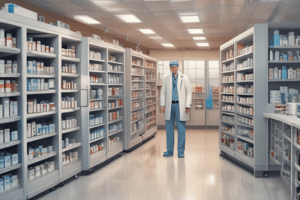Podcast
Questions and Answers
What is the primary focus of critical care pharmacy?
What is the primary focus of critical care pharmacy?
- Optimizing patient outcomes in ambulatory care settings
- Providing pharmaceutical care to critically ill patients in ICUs (correct)
- Developing medication protocols for outpatient clinics
- Conducting research on new medication therapies
What is a key responsibility of critical care pharmacists?
What is a key responsibility of critical care pharmacists?
- Developing medication protocols for pediatrics
- Conducting medication therapy management in a clinic
- Participating in bedside rounds with the ICU team (correct)
- Dispensing medications in a retail setting
What is a key skill required for critical care pharmacists?
What is a key skill required for critical care pharmacists?
- Ability to communicate only with patients
- Strong understanding of critical care medicine (correct)
- Ability to work in a slow-paced environment
- Ability to interpret only basic life support principles
What type of medication is commonly used in critical care settings for hemodynamic support?
What type of medication is commonly used in critical care settings for hemodynamic support?
What is a key responsibility of critical care pharmacists in terms of quality improvement?
What is a key responsibility of critical care pharmacists in terms of quality improvement?
What is an important aspect of critical care pharmacists' work in terms of medication therapy?
What is an important aspect of critical care pharmacists' work in terms of medication therapy?
What type of nutrition support is commonly used in critical care settings?
What type of nutrition support is commonly used in critical care settings?
What is a key aspect of critical care pharmacists' work in terms of education?
What is a key aspect of critical care pharmacists' work in terms of education?
Which brain region coordinates muscle movements?
Which brain region coordinates muscle movements?
What is the primary goal of osmotherapy in cerebral edema management?
What is the primary goal of osmotherapy in cerebral edema management?
What is the normal range of intracranial pressure?
What is the normal range of intracranial pressure?
Which of the following is an inhibitory neurotransmitter?
Which of the following is an inhibitory neurotransmitter?
What is the primary goal of thrombolysis in ischemic stroke management?
What is the primary goal of thrombolysis in ischemic stroke management?
What is the role of the vertebral and basilar arteries in the brain?
What is the role of the vertebral and basilar arteries in the brain?
What is the primary goal of elevating the head of the bed in cerebral edema management?
What is the primary goal of elevating the head of the bed in cerebral edema management?
What is the primary goal of control of blood pressure in hemorrhagic stroke management?
What is the primary goal of control of blood pressure in hemorrhagic stroke management?
Flashcards are hidden until you start studying
Study Notes
Overview of Critical Care Pharmacy
- Critical care pharmacy is a specialized field of pharmacy practice that focuses on the care of critically ill patients in intensive care units (ICUs) and other high-acuity settings.
- Critical care pharmacists work as part of a multidisciplinary team to optimize patient outcomes, improve safety, and reduce healthcare costs.
Key Responsibilities of Critical Care Pharmacists
- Participate in bedside rounds with the ICU team to provide pharmaceutical care and make recommendations on medication therapy.
- Monitor and manage medication therapy for critically ill patients, including those with complex medical conditions and multiple organ dysfunction.
- Develop and implement medication protocols and guidelines for ICU patients.
- Provide education and training to healthcare professionals on medication therapy and pharmacological principles.
- Participate in quality improvement initiatives to improve patient outcomes and reduce medication errors.
Key Skills and Knowledge Required
- In-depth knowledge of pharmacology, pharmacokinetics, and pharmacodynamics.
- Strong understanding of critical care medicine, including pathophysiology, diagnosis, and treatment of critically ill patients.
- Ability to interpret and apply evidence-based medicine to patient care.
- Excellent communication and teamwork skills.
- Ability to work effectively in a fast-paced, high-stress environment.
Common Medications and Therapies in Critical Care
- Vasopressors (e.g., dopamine, norepinephrine, vasopressin) for hemodynamic support.
- Sedatives and analgesics (e.g., propofol, midazolam, fentanyl) for pain and anxiety management.
- Antimicrobials (e.g., vancomycin, meropenem) for infection management.
- Cardiovascular medications (e.g., beta blockers, ACE inhibitors) for cardiovascular support.
- Nutritional support and total parenteral nutrition (TPN).
Common Critical Care Conditions and Syndromes
- Sepsis and septic shock
- Acute respiratory distress syndrome (ARDS)
- Cardiogenic shock
- Acute kidney injury (AKI)
- Neurocritical care (e.g., stroke, traumatic brain injury)
Technology and Tools Used in Critical Care Pharmacy
- Electronic health records (EHRs) and computerized provider order entry (CPOE) systems.
- Automated dispensing cabinets (ADCs) and barcode medication administration (BCMA) systems.
- Infusion pumps and smart pumps for medication delivery.
- Pharmacokinetic software and apps for medication dosing and monitoring.
Critical Care Pharmacy Overview
- Focuses on care of critically ill patients in ICUs and high-acuity settings
- Critical care pharmacists work with a multidisciplinary team to optimize patient outcomes, safety, and healthcare costs
Key Responsibilities
- Participate in bedside rounds with ICU teams to provide pharmaceutical care and make recommendations
- Monitor and manage medication therapy for critically ill patients
- Develop and implement medication protocols and guidelines for ICU patients
- Provide education and training to healthcare professionals on medication therapy and pharmacological principles
- Participate in quality improvement initiatives to improve patient outcomes and reduce medication errors
Key Skills and Knowledge
- In-depth knowledge of pharmacology, pharmacokinetics, and pharmacodynamics
- Strong understanding of critical care medicine, including pathophysiology, diagnosis, and treatment of critically ill patients
- Ability to interpret and apply evidence-based medicine to patient care
- Excellent communication and teamwork skills
- Ability to work effectively in a fast-paced, high-stress environment
Common Medications and Therapies
- Vasopressors (e.g., dopamine, norepinephrine, vasopressin) for hemodynamic support
- Sedatives and analgesics (e.g., propofol, midazolam, fentanyl) for pain and anxiety management
- Antimicrobials (e.g., vancomycin, meropenem) for infection management
- Cardiovascular medications (e.g., beta blockers, ACE inhibitors) for cardiovascular support
- Nutritional support and total parenteral nutrition (TPN)
Common Critical Care Conditions and Syndromes
- Sepsis and septic shock
- Acute respiratory distress syndrome (ARDS)
- Cardiogenic shock
- Acute kidney injury (AKI)
- Neurocritical care (e.g., stroke, traumatic brain injury)
Technology and Tools
- Electronic health records (EHRs) and computerized provider order entry (CPOE) systems
- Automated dispensing cabinets (ADCs) and barcode medication administration (BCMA) systems
- Infusion pumps and smart pumps for medication delivery
- Pharmacokinetic software and apps for medication dosing and monitoring
Neuroanatomy
- Cerebrum divided into two hemispheres (left and right)
- Cerebellum coordinates muscle movements
- Brainstem connects cerebrum to spinal cord
- Anterior circulation supplied by internal carotid arteries
- Posterior circulation supplied by vertebral and basilar arteries
- Cerebrospinal fluid (CSF) produced in ventricles
- CSF flows through cerebral aqueduct
- CSF absorbed into bloodstream
Cerebral Edema Management
- Vasogenic edema: increased permeability of blood-brain barrier
- Cytotoxic edema: cellular swelling
- Osmotherapy involves administering mannitol or hypertonic saline
- Elevation of head of bed helps manage edema
- Control of blood pressure and oxygenation crucial
- Steroids (dexamethasone) used in specific cases
Intracranial Pressure Monitoring
- Invasive monitoring methods: intraparenchymal probes (e.g., Camino or Codman) and ventriculostomy
- Non-invasive monitoring methods: transcranial Doppler (TCD) and ICP calculation using CT or MRI
- Normal ICP: 0-10 mmHg
- Elevated ICP: 11-20 mmHg
- Critical ICP: >20 mmHg
Neurotransmitters and Pharmacology
- Excitatory neurotransmitters: glutamate and aspartate
- Inhibitory neurotransmitters: GABA and glycine
- Sedatives and anesthetics: propofol, midazolam, and fentanyl
- Neuroprotective agents: barbiturates (e.g., pentobarbital) and hypothermia
Stroke Management
- Ischemic stroke management: thrombolysis (tPA) within 3-4.5 hours and mechanical thrombectomy
- Hemorrhagic stroke management: blood pressure control and surgical evacuation of hematoma
- Neurocritical care involves airway management, cardiovascular support, and temperature control (normothermia)
Studying That Suits You
Use AI to generate personalized quizzes and flashcards to suit your learning preferences.




